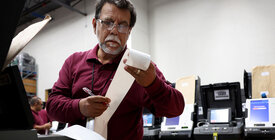
Survey Finds Election Officials Want More Support Amid Federal Cutbacks and Ongoing Threats
Local election officials are concerned about the loss of federal support for election security and hope state and local governments will step in to fill the void.

Part of
The rollback of federal support for elections this year presents new difficulties for officials. Over the past two decades, the role of local election officials has evolved to meet new challenges in administering elections, including heightened cybersecurity threats, the proliferation of false rumors about elections, and escalating threats to the safety of voters and election workers alike. Their previously behind-the-scenes, bureaucratic role — often done in tandem with other responsibilities like administering marriage certificates — has become increasingly complex, specialized, and subject to immense public scrutiny. Now, major cuts to the federal support and partnership that local election offices have long depended on to fund and protect elections have raised alarms.
The Brennan Center’s 2025 survey of local election officials finds that a majority of election officials are concerned about recent federal cutbacks to election support, including election security programs. Eighty-seven percent of respondents said it was important for state and local governments to help fill the void these cuts have created. Also high on the list of officials’ concerns are potential efforts to interfere in their ability to run elections, including through politically motivated investigations.
Concerns identified in our previous annual surveys persist, including reports of threats, harassment, and abuse. Additionally, even as officials report that their offices have increased cooperation with state and local authorities to build resilience in the face of these and other obstacles, they continue to stress the need for more resources to address long-term challenges, such as aging equipment and insufficient staff and poll workers.
In another novel development, a growing number of election officials reported being approached by companies selling artificial intelligence products to assist them in their work. Though only a small number of officials reported using AI tools, the share of officials who said they want more guidance from government agencies on using AI in their work jumped significantly compared to 2024.
Concerns about federal cutbacks
The federal government has long partnered with local election offices to fund and protect elections, especially since the Department of Homeland Security designated election systems as critical infrastructure in 2017. In particular, the Cybersecurity Infrastructure and Security Agency (CISA), the federal agency responsible for coordinating cybersecurity protections with states, has offered vital resources to election officials, such as threat intelligence briefings and cybersecurity and physical security assessments. The Trump administration froze all election security support soon after taking office and suspended CISA’s election security advisers.
The administration also cut funding for the Elections Infrastructure Information Sharing & Analysis Center, a network that facilitated information sharing about security risks and best practices between election vendors and election officials, among others. In 2024, the network warned election officials that envelopes filled with white powder had been sent to election offices across the country.
The new Brennan Center survey finds many local election officials are concerned about the loss of federal support. Sixty percent of those surveyed said they are very or somewhat concerned about federal cuts to election security services. Among those who reported having “heard a lot” about these federal cuts, concerns were much higher (90 percent were concerned). And 61 percent were specifically concerned about CISA changing or cutting its services to election officials.
In the face of federal cutbacks, local election officials continue to build resilience at the local level. Ninety-four percent of officials worked with a local or state agency or department to prepare for a safe and secure election in 2024, with 80 percent reporting coordination with law enforcement.
Amid continued threats to local election officials and voters, collaboration with law enforcement around things like exchanging contact information and sharing election details increased since 2024. Among officials who were threatened because of their job, 62 percent reported the threat to law enforcement, up from 54 percent last year. The number of offices that coordinated with local law enforcement in the past election cycle increased from 62 percent to 82 percent.
Despite the increased collaboration at the federal, state, and local levels, the vast majority of election officials believe that there is more work to be done to build local and state resilience: 87 percent say it’s very or somewhat important for local and state government to make up the funding gap left by federal cuts.
Concerns about interference
Election officials also face new risks of investigations or lawsuits against them. In April, President Trump targeted Christopher Krebs, his own appointee to lead CISA in 2018. An executive order accused Krebs of misconduct for refuting false claims that the 2020 election result was fraudulent. In the lead-up to the 2024 election, the Georgia State Election Board requested a second investigation into Fulton County election officials after the first investigation found no evidence of fraud.
Many officials reported concerns about political interference in their work: 46 percent are concerned about politically motivated investigations of election officials, and 59 percent worry about political leaders interfering with how election officials do their jobs.
These widespread concerns were present even before a New York Times report (published after the Brennan Center collected survey responses) indicated that the Department of Justice is exploring whether it can bring criminal charges against election officials who “have not sufficiently safeguarded their computer systems.” This news follows sweeping demands for information from prosecutors at the DOJ and separate requests to other states about their voting laws and policies. The Department of Justice sued Orange County, California, in June after the county refused to turn over personally identifying information about voters.
Many of these requests and actions appear to draw on unfounded rumors that noncitizens routinely vote in federal elections or that election equipment has been hacked. The Brennan Center survey found that 81 percent of local election officials are concerned about false information about elections spreading on social media.
Threats, harassment, and abuse
Reports of threats, harassment, and abuse remain largely consistent from last year’s survey. Thirty-six percent of officials reported experiencing harassment or abuse, and 16 percent said they had been threatened because of their job. Of those threatened, 63 percent were threatened in person — and these threats most commonly occurred at the office. In total, 38 percent said they had been threatened, harassed, or abused, similar to last year’s number.
Just over half of officials said they were very or somewhat concerned about the safety of their colleagues or staff, and 1 in 4 said the same about their family or loved ones being threatened or harassed.
Artificial intelligence
The reported use of AI in election administration remains low. Among the 8 percent of officials who reported using AI in their work, they used it for routine tasks like drafting social media content and creating graphics. This number may increase in the coming years; about twice that number (15 percent) have been approached by vendors who sell products that use AI. The Brennan Center has advocated for more guidance for election officials as to how and when to use AI in their work as the technology becomes more ubiquitous.
Finally, the number of election officials who want guidance from government agencies about using AI in election administration increased from 31 percent in 2024 to 40 percent in 2025, with 39 percent saying they were unsure how helpful such guidance would be and 21 percent saying such guidance would not be helpful.
• • •
This year’s survey shows that many of the challenges from the last several years remain. Local election officials are working to protect elections, the cornerstone of a healthy democracy, in an increasingly politicized and turbulent environment. The loss of federal support for elections further strains these local offices that are often understaffed. States and civil society need to act to fill the gaps left by the federal government. With the midterm elections coming up in 2026, this work must begin now.
More from the Local Election Official Surveys series
-
Local Election Officials Survey — July 2025
60 percent of local election officials are concerned about federal cuts to election security services, and 87 percent say it’s important for state and local government to provide additional resources to make up for the cut funds and support. -
Poll of Election Officials Finds Concerns About Safety, Political Interference
The vast majority of local election officials have taken new precautions to secure the 2024 election. -
Local Election Officials Survey — May 2024
Since 2020, 92 percent of local election officials have taken steps to increase election security for voters, election workers, and election infrastructure.




